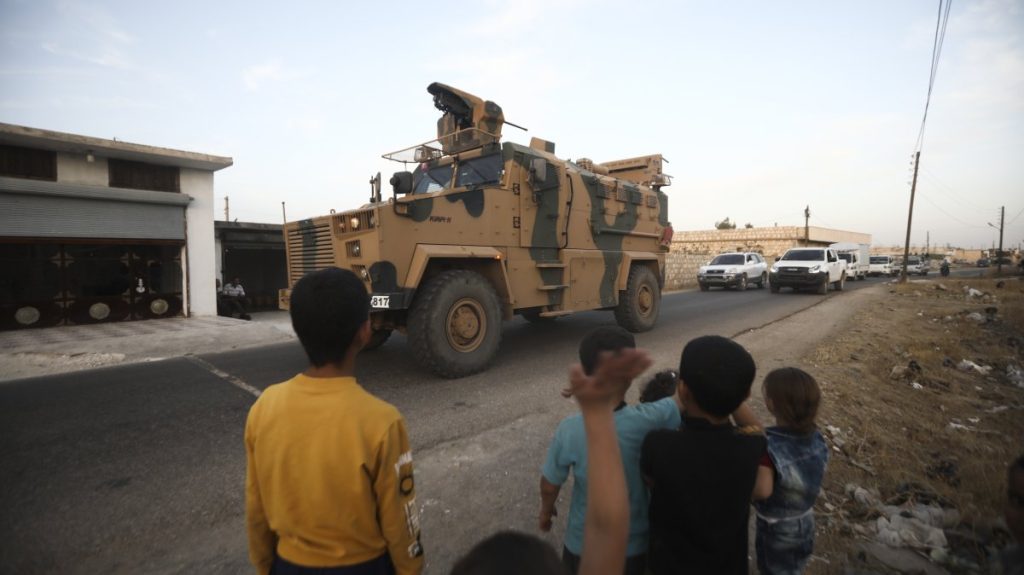The Turkish military presence in neighboring Syria will continue and may even relocate within that country based on “needs,” Turkish Defense Ministry sources said Thursday.
The statements come amid the fate of the U.S.-backed YPG, the Syria wing of the PKK terrorist group, which poses a direct threat to Türkiye.
Sources said the tasks of the Turkish Armed Forces (TSK) have not been completed yet in Syria. “Depending on the need, the redeployment of our troops in Syria or their assignment to different regions may be considered,” sources said.
As the civil war escalated in Syria, the terrorist groups Daesh and PKK/YPG emerged as major threats, especially in the country’s north. Fearing spillover of the violence and in support of Syrian opposition forces and civilians displaced by terrorists, Türkiye launched a string of cross-border offensives into the country. Those include Operation Euphrates Shield in 2016, Operation Olive Branch in 2018 and Operation Peace Spring in 2019.
The sources said Türkiye was in contact with the new administration of Syria after the fall of the Baathist regime to boost the defense and security capacity of the Syrian army. “The local population, the real owners of lands the terrorist group occupied, can no longer tolerate the terrorist group and demand their exit,” sources said.
Earlier this month, Foreign Minister Hakan Fidan said that they may launch a military operation against the PKK/YPG unless they accepted Ankara’s ultimatum for a bloodless transition in post-Assad Syria.
“We will do what’s necessary,” Fidan said.
Asked what that might entail, he said: “A military operation.”
Assad’s ouster raised the prospect of Türkiye intervening directly in the country against the PKK/YPG, which was behind a string of terror attacks targeting Turkish cities and civilians in recent years. Fidan said the YPG/PKK should expel terrorists among them who joined from Türkiye, Iran and Iraq and they should leave Syria immediately, adding they have not seen any preparation nor any intention yet to do so. The foreign minister also said Türkiye could take over the management of prisons and detention camps holding Daesh members in Syria if the new leadership were unable to do so. Currently, those camps are under the control of the PKK/YPG. The U.S. justifies its partnership with the YPG/PKK as a cooperation to fight against Daesh.
Syria’s new rulers also raised the prospect of the dissolution of the YPG and their integration into the fledgling army of post-Assad Syria. Murhaf Abu Qasra, the defense minister of Syria’s new administration, said on Wednesday that it must dissolve itself before a National Dialogue Conference.
When asked about the PKK/YPG terrorist group’s position on the issue of armed groups dissolving themselves and gathering under the roof of the Ministry of Defense, Abu Qasra stated: “Negotiations are ongoing. We are ready for any scenario.”
In an interview with Saudi Arabia’s Asharq News channel earlier this month, YPG leader Ferhat Abdi Şahin, code-named “Mazloum Kobani,” said their “basic demand” is for decentralized administration. The demand poses a potential challenge to Syria’s new leadership, which wants to bring all of the country back under the government’s authority after ousting Bashar Assad last month. Şahin indicated that they had no intention of dissolving, saying it was open to linking with the Defense Ministry and operating according to its rules but as “a military bloc.”
The fight against the PKK is also underway in Iraq, where Türkiye deployed troops to several regions in that neighbor’s north for Operation Claw-Lock. Ministry sources said the army’s work in Iraq is not done yet as well and they are now working to destroy shelters where terrorists hid and stocked weapons and supplies.
Sources said troops were also working to dismantle a large number of land mines and handmade explosives terrorists laid to kill troops. “Work is underway in coordination with Iraqi authorities,” sources said.
On Thursday, Defense Minister Yaşar Güler received Mansur Barzani, a general who commands the Special Forces of the Peshmerga, an armed force of Iraq’s Kurdistan Regional Government (KRG). The KRG controls northern Iraqi regions where the PKK’s senior cadres are believed to be in hiding. The ministry did not comment on the details of the meeting, but it was most likely about the joint fight against terrorism. Turkish and Iraqi officials have been engaged in more talks in the past two years for counterterrorism efforts. The Iraqi government and KRG administration pledged more cooperation with Ankara on the matter.
Separately, the Defense Ministry’s press adviser, Brig. Adm. Zeki Aktürk, said on Thursday that security forces have eliminated 221 terrorists since Jan. 1, including 64 in Iraq and 157 in northern Syria.


